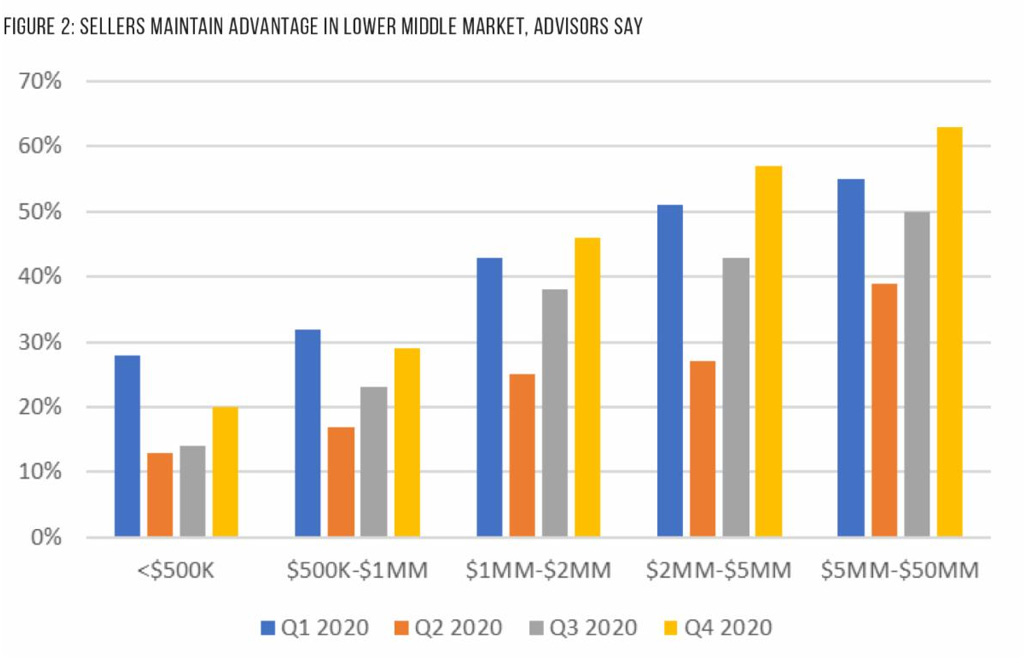Cybersecurity a buyer priority
New research from Datasite reveals that cybersecurity is the leading issue that causes buyers to withdraw from a deal in due diligence.
When asked how often a deal does not progress due to an issue uncovered in due diligence, deal makers said about 1 in 10 deals fell through. Among the problem areas most likely to kill a deal, cybersecurity issues led the pack at 36%, followed by financial weakness, excessive valuation, financial irregularities, and leadership issues.
Talk to your technology advisors about data security issues and consider securing an external audit from a third-party firm (ask your CPA for a referral) to ensure your information management practices are up to snuff.
Market Pulse Survey – Quarter 4, 2020
Presented by IBBA & M&A Source

Financing M&A in a pandemic

Gopal Maheshwari
Managing Partner
One year ago, buyers were looking for talent. Every company we talked to was up against the same problem – there was so much opportunity to be had, but none of the employees to make it happen. It’s amazing how much can change in year.
Business buyers today are coming to the table for a host of reasons. The fortunate ones who benefitted from a “COVID-windfall” (e.g., tech, grocery, janitorial…and now, dry ice manufacturers) will be looking to capitalize on that success with acquisitions to drive long-term growth.
Banks are willing to lend, but they have pulled back slightly. Traditionally, lower middle market deals have senior debt at an average of 3x EBITDA. Now that’s down to 2.5 or 2.75x, according to GF Data. In 2020, senior lending in M&A hit the lowest we’ve seen in five years.
To compensate, the capital stack is being filled in through increased buyer equity and increased rollover equity. Rollover equity is when the business owner or management team retain a stake in the enterprise.
Buyers like it when sellers keep some skin in the game. It shows they have faith in the business and are committed to its ongoing success. For businesses valued between $10 million and $25 million, rollover equity accounted for 13.2% of deal funding through November 2020.
We saw an uptick in buyer equity in Q2 2020, likely stemming from buyers who were committed to getting deals done, even during the initial chaos after the pandemic hit. In the first nine months of 2020, equity share on platform deals averaged 54.5%. The quarterly splits, though, are notable: 1Q-53.2%; 2Q-61.6%; 3Q-51.4%.
We are still seeing buyers bringing a greater share of capital to the table in Q4. Anecdotally, in one recent Wisconsin deal we managed, the buyer opted not to take all of the debt available to them. They’re financing the deal with senior debt at just over 2x EBITDA with the balance in buyer equity and management team rollover equity.
In this case, the buyer is acquiring a manufacturer running at capacity. By not fully leveraging themselves in the transaction, they’ll have a strong equity position to support significant new investments to increase production. Similarly, other buyers are pulling back on leverage in order to maintain some breathing room in case the pandemic gets worse before it gets better.
At the start of the pandemic most industry experts would have told you to expect an increase in earnouts in order to get deals done, but that hasn’t happened. Sellers typically don’t like earnouts, and because the demand for COVID-proof businesses remained strong in 2020, sellers were generally able to avoid those deal terms.
As risk and uncertainty subside in the months ahead, we may see a return to more typical funding trends. Interest rates are at historic lows and cheap debt will help more buyers and sellers bridge their valuations gaps.
This update is presented by GM Corporate Solutions in association with our partner Cornerstone International Alliance
